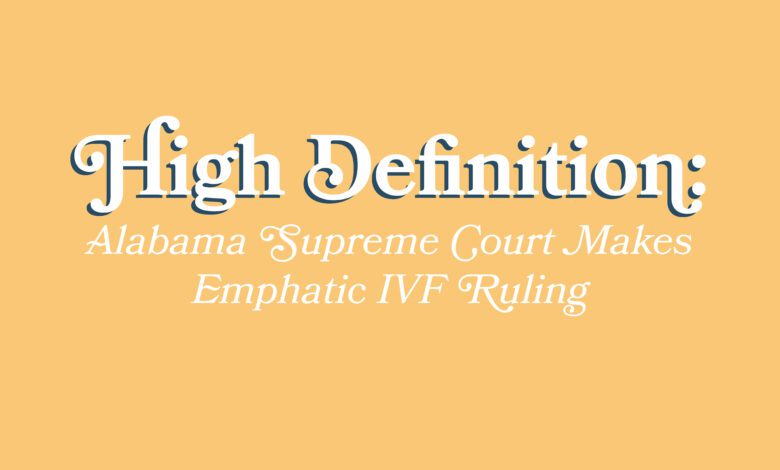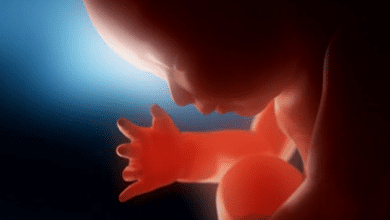Alabama Supreme Court Makes Emphatic IVF Ruling

Unborn children are children. weather It doesn’t matter if they are found in the womb, or in a cryogenic nursery through in vitro fertilization.
That’s the tenor of the 8-1 decision handed down by the Alabama Supreme Court on February 16. The plaintiffs in the case, parents who lost embryos due to the negligence of a fertility clinic, appealed to Alabama’s highest court after they were rejected in a lower court.
The lower court ruled that the embryos did not meet the definition of a person or child, and were only considered “property.” The wrongful death claim was dismissed, but the fertility clinic was found guilty of a lesser charge of breach of contract.
The clinic’s negligence occurred in December 2020. According to court records, “A patient at an Alabama hospital wandered into the fertility clinic through an unsecured door. The patient then enters the cryogenic nursery and some embryos are removed. The subzero temperatures where the embryos were stored froze-burned the patient’s hand, causing the patient to drop the embryos on the floor, killing them.”
In the Alabama Supreme Court case, the defendants argued that an unborn child ceases to qualify as a “child” or “person” if the child is not contained within a biological womb. The court disagreed, ruling that the state’s Wrongful Death of a Minor Act “applies on its face to all unborn children, without limitation.”
“Neither the text of the Wrongful Death of a Minor Act nor the precedents of this court exclude extrauterine children from the scope of the Acts. Unborn children are children under the act, without exception based on stage of development, physical location, or any other additional characteristics.”
Additionally, the Alabama Constitution upholds the concept that unborn children are, in fact, entitled to legal rights.
Albert Mohler, president of Southern Baptist Theological Seminary, called the court’s reasoning “unassailable”.
“It is absolutely true that the human embryo is a human being, endowed with human dignity, made in the image of God,” Mohler said on his podcast, The Briefing. “A human embryo is a human being, wherever that embryo is located.”
Over the past 20 years, Mohler spoke out against IVFchallenges the evangelical community to consider the fate of frozen embryos that are never implanted (or later destroyed) as a sanctity of life issue.
“The Supreme Court of the State of Alabama has really thought about this issue,” Mohler said. “It’s done in a way that’s likely to not only spark a lot of conversation, [but will hopefully] prompts much moral thought, even as a stirring to the conscience of American evangelicals.”
As a result of this decision, at least three Alabama IVF providers have stopped treatment according to news reports, citing concerns over potential civil and criminal liability. Some critics say the decision casts doubt on future access to IVF procedures in the state, affecting many families and individuals seeking fertility treatments.
However, an article on March 5 at World Magazine“IVF clinics, patients, lawmakers don’t understand the Alabama decision,” sought to clarify the situation.
“Alabama Attorney General Steve Marshall had already clarified that he does not intend to use the decision as a basis to prosecute IVF doctors or families who use their services,” Leah Savas wrote.
The article also quotes pro-life attorney Sam McLure, who has worked on embryo adoption cases. McLure said the decision itself is clear that it does not affect the state’s criminal homicide laws: “That was not asserted anywhere, not even in the dissenting opinion. This opinion is very narrow…”
In response to the potential effects of this decision, ongoing legislative activity within Alabama seeks to clarify the legal status of frozen embryos and ensure the continuation of IVF services while protecting the embryos.
In its decision, the Alabama Supreme Court referred to Webster’s Dictionary in upholding its definition of embryos as children.
“This Court’s most cited dictionary defines son as ‘an unborn or recently born person,’” the ruling said. “And all the other major dictionaries follow suit… The Oxford English Dictionary [defines] son as an ‘unborn or newborn person’… Webster’s Third New International Dictionary [defines] child as ‘an unborn or recently born person.’”
“There is no simple patent or latent ambiguity in the word son.”





